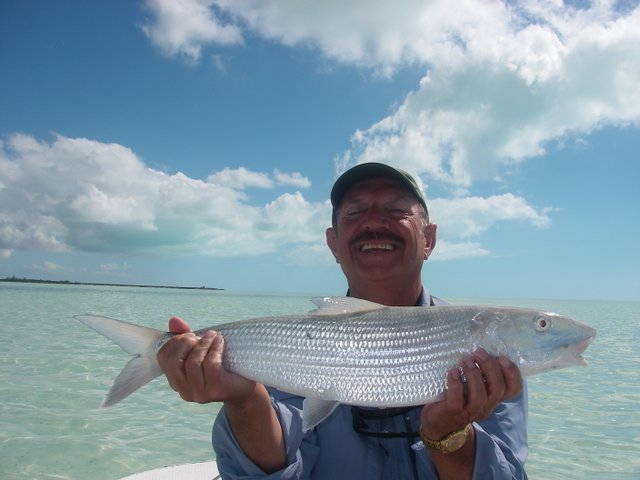 Rig your rods with flies before you step into
a boat. This way when your guide stops the boat you are on the bow
and ready to fish by the time he makes his first push with the
pole. I can’t tell you how many times I caught and landed
bonefish while someone was struggling to get their rod strung up.
Rig your rods with flies before you step into
a boat. This way when your guide stops the boat you are on the bow
and ready to fish by the time he makes his first push with the
pole. I can’t tell you how many times I caught and landed
bonefish while someone was struggling to get their rod strung up.
Change your fly or tippet when your partner
is fishing. Bone fishing is expensive and time is money, why waste
your turn tying on a tippet or fly when you could be fishing.
Always check your knots – a bonefish will
break you off very quickly with a poor knot.
Set your drag before you stand to fish and keep your hand away
from the reel once a bonefish is on until the bone stops its run.
Drag sets are very important! See me on this!
Help your partner manage his line when he is up in the bow and you
are sitting down, especially on windy days, the sooner he lands a
fish the sooner you can get up and fish!
The best way to share a boat is to establish a time period that
you will be in the bow fishing, say 30 minutes. If you catch a
fish before your time period ends you should step down and your
partner can get up to fish.
Don’t rock the boat or make noises on the boat while your
partner is fishing for all the same reasons above. I walk on tip
toes and try not to make a sound – a thud from the cooler lid
can be heard by bones hundreds of feet away.
Stripping and setting the hook is not only critical, it’s 50% of
the game! See me about this on arrival day.
25 years of hunting big bonefish has developed me into an expert
on the subject. I will gladly share these tactics with you at your
asking – that’s why you pay me the big bucks. Take advantage
of the opportunity!
Like most fishing, a great day on the bonefish flats is predicated
on weather conditions and the severity of the wind. A 5-15 mph
wind is perfect for polling and 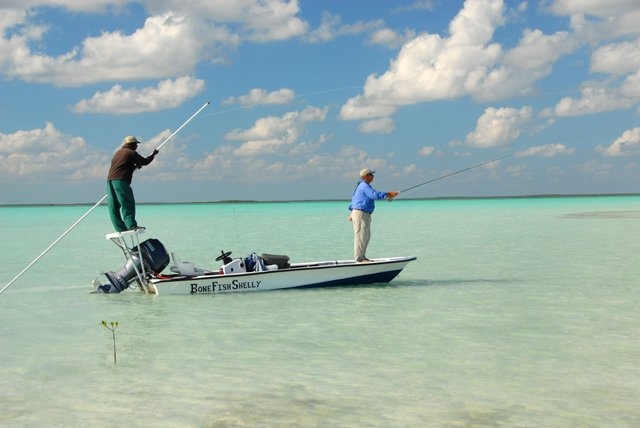 casting. At 15-20 mph it gets a
little tougher for both the guide and the caster. I’ve caught
some of my biggest bones in 15-30 mph mainly because I have great
(independent, private) guides that can pole the boat in the wind
and know how to locate the fish. During high wind conditions you
need to cast very tight loops with high line speed………..
Sunlight is also a very important factor. It is very difficult for
the guide to see bones if it’s cloudy. Fortunately, it is
usually sunny or partly cloudy in
Andros
during the periods that I go to
Andros
(March – mid April and November). I try to stay away from the
hot months (late April- mid October) when the prevailing winds
switch toward the south which draws moisture and creates clouds
and showers. Bottom line - mild wind and sun, great bonefishing…
heavy wind and poor light, it gets tougher.
casting. At 15-20 mph it gets a
little tougher for both the guide and the caster. I’ve caught
some of my biggest bones in 15-30 mph mainly because I have great
(independent, private) guides that can pole the boat in the wind
and know how to locate the fish. During high wind conditions you
need to cast very tight loops with high line speed………..
Sunlight is also a very important factor. It is very difficult for
the guide to see bones if it’s cloudy. Fortunately, it is
usually sunny or partly cloudy in
Andros
during the periods that I go to
Andros
(March – mid April and November). I try to stay away from the
hot months (late April- mid October) when the prevailing winds
switch toward the south which draws moisture and creates clouds
and showers. Bottom line - mild wind and sun, great bonefishing…
heavy wind and poor light, it gets tougher.
Rod - #8 or #9
weight, 9 foot. The #8
weight - 9’-0” is the best all around size for bonefish. My
favorite bonefish rod is the Loomis GLX (2 piece). The
Sage TCR is also super fast! The
piece GLX is also very good, but slower.
I carry 3 - 4 rods: 8, 9 and 10 weights. You should have at
least one extra rod in case of an emergency.
The extra rod can be rigged for permit, tarpon or barracuda
opportunities - a #9
or #10 weight system would be great for this.
Lines
- A weight forward ‘bonefish’ or ‘saltwater taper’
floating line with 200 yards minimum 20 lb. backing.
I am now using the Scientific Anglers Bonefish Taper and
the Wulff Triangular Taper lines with 250 yards of the Gudebrod
SST backing. This
backing is much thinner and many times more abrasion resistant
than the old style dacron backing.
This translates into fewer cut off's when the fish run into
the mangroves or over coral. Still,
bring an extra line on board with you just in case.
Reels - I believe inexpensive reels are false economy for
bonefish. In much too
short a time they fail, usually losing a big fish. I use
Waterworks, Lamson, Tibor, Billy Pate and Hatch reels –
if in stock, we offer 20% off list price for these reels for all
participants and 10% off if we special order.
The Tibor reels are excellent ‘high end’ bonefish reels
that have a superior drag system and can also be used for large
tarpon. Tibor now has
a model with a quick change spool that’s nifty but pricey.
Leaders - I use
9 or 10 foot leaders with 12 to 16 lb. tippets in the Bahamas
for bonefish and permit. I
never go less than 12 lb test, But occasionally in real shallow
water, I'll add a length of 10 lb. tippet for spooky conditions on
very shallow flats.
Flies - Like
trout flies, there are hundreds of bonefish patterns.
I believe in keeping it simple but effective.
The patterns that have been very
successful for me in the
Bahamas
are those that imitate sand crabs and shrimp.
-Hoochy
Caucci Bonefish Flies in white, tan and pink - #8, #6, #4,
#2. I like the tan flies best 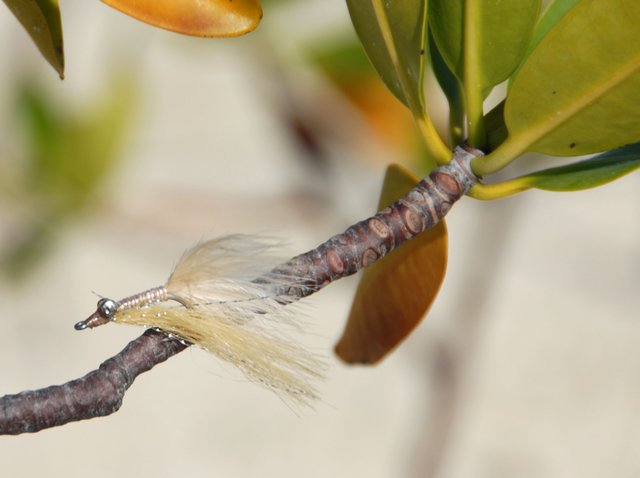 under most conditions,
incredibly effective, I use
90 % of the time for mid to big size bonefish, saves me from
loosing time changing flies.
under most conditions,
incredibly effective, I use
90 % of the time for mid to big size bonefish, saves me from
loosing time changing flies.
-Clouser
Minnows are very good- tan/white, chartreuse/white, &
olive/white, #2, #4, #6
-Gotcha’s
are also excellent if tied properly. #2, #4, #6
-Needlefish
Barracuda Patterns and large Lefty Deceiver patterns in
sizes 2/0 to #2 for barracuda
-Great
Tarpon flies are the Classic Cockroach in 2/0 and poppers
in the same size.
Note:
My bonefish flies have a variety of bead chain and lead
eyes, from tiny to large. This
will control the sink rate. I
would rather use 1 pattern (say a #6 or #4 Hoochy Caucci tan with
different size eyes (mini,
small, medium lead eyes plus two different sizes of bead chain)
than use 6 different patterns. All in all, except for special occasions, bonefish are
rarely selective to pattern types. More important is presentation, size, color, proper depth
and retrieve. The color of the fly should match the bottom of the
flats that you fish. If
you want to tie your own flies, get a copy of Dick Brown’s,
“Bonefish Fly Patterns”, which includes the dressings for the
flies including the Hoochy Caucci (I don’t bother with the epoxy
these days)
Accessories
- Be sure to bring your medicines, sun protection creams,
lotions and chap stick.
Fisherman will also need to bring a stainless steel leader
sniper, hemostats, needle nose pliers, fly boxes,
hook hone, wire cutters, reel lubricant, line cleaner,
flies, leaders, and tippet material.
I also car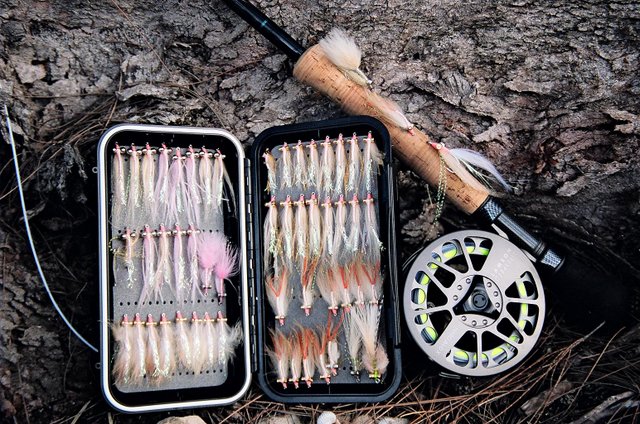 ry a Boga Grip scale to handle and
weigh each fish I catch.
I can also remove my hook without
touching the fish. Prolonged
handling removes the protective slime on bonefish and makes them
very vulnerable to sharks and barracuda.
You will need a waterproof bag to carry your gear aboard
the bonefish skiffs, plus a large plastic garbage bag to protect
it from rain and salt spray if your boat bag isn't
waterproof. A
fanny pack for wading can be handy.
You should also bring
protective covers for your reels to keep sand out.
ry a Boga Grip scale to handle and
weigh each fish I catch.
I can also remove my hook without
touching the fish. Prolonged
handling removes the protective slime on bonefish and makes them
very vulnerable to sharks and barracuda.
You will need a waterproof bag to carry your gear aboard
the bonefish skiffs, plus a large plastic garbage bag to protect
it from rain and salt spray if your boat bag isn't
waterproof. A
fanny pack for wading can be handy.
You should also bring
protective covers for your reels to keep sand out.
Particularly convenient are the single or
double rod cases that I use to hold two 2 and 4 piece assembled
rods and reels safely. I
carry them on to the plane and the boat all rigged and ready to
go.
Clothing
- Shorts, bathing suits and light weight long pants and long
sleeve shirts (for protection from sun) are used on the flats.
Breathable supplex is available today in most catalogs and
shops. An up-downer hat or long billed cap and at least one
pair of good polarized
sunglasses (preferable with side shields). I prefer amber
or brown. I
carry two pair, one for running (boat) and another for
fishing so they are always clean.
You may wear mesh beach shoes on sand flats or wading shoes by
Bite and others for wading on sand or coral type flats and for
standing on the bow of the boat.
A waterproof rain
jacket is absolutely necessary and will keep you dry during a squall or from
spray from the boats wake. Spray
will ruin most Gortex jackets
so I suggest the cheaper PVC and rubber jackets although the
weather may be in the 80’s during the day, I bring a light
fleece jacket which keeps me comfortable on those early morning
runs to the West Side.
Learn more about
Al Caucci's Andros Bonefish Trips Here
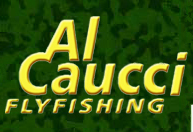
![]()
![]()
![]()
![]()
![]()
![]()
![]()
![]()
![]()
![]()

 Rig your rods with flies before you step into
a boat. This way when your guide stops the boat you are on the bow
and ready to fish by the time he makes his first push with the
pole. I can’t tell you how many times I caught and landed
bonefish while someone was struggling to get their rod strung up.
Rig your rods with flies before you step into
a boat. This way when your guide stops the boat you are on the bow
and ready to fish by the time he makes his first push with the
pole. I can’t tell you how many times I caught and landed
bonefish while someone was struggling to get their rod strung up.
 under most conditions,
incredibly
under most conditions,
incredibly ry a Boga Grip scale to handle and
ry a Boga Grip scale to handle and